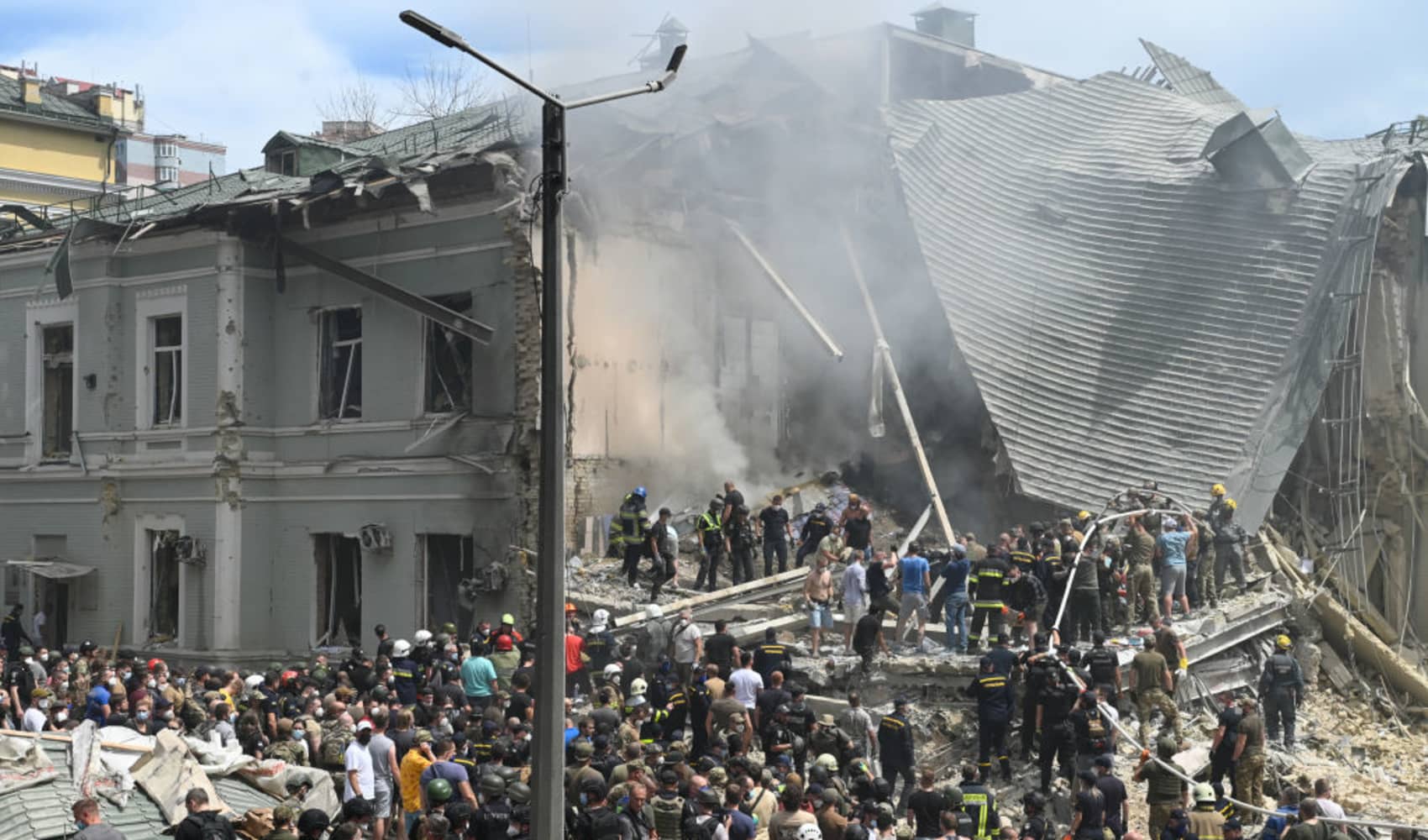
This year, Ukraine’s largest music festival struck a different chord. Gone were the international headliners, the massive performance halls and the hundreds of thousands of visitors.
Instead, beloved local artists graced the stage this past weekend at the Atlas Festival — the first since Russia's full-scale invasion in February 2022 — for a smaller but still ebullient crowd. The stage was erected in a shopping mall parking lot, the only option with a shelter large enough to contain the 25,000 people expected in the event of an air raid.
Carefree youth danced, romanced and sang along, rubbing shoulders with hardened military commanders as famous singers who crooned lyrics imbued with national pride. Music was the main goal, but so was shattering the illusion that the capital is invulnerable to the bloody battles hundreds of miles away.
“Such kind of festivals can’t be separated from the life of the country. The country is at war. The core issues here should relate to the war,” said Vsevolod Kozhemyako, a businessman and one of the founders of the 13th “Khartia” Brigade, now a part of Ukraine’s National Guard and defending the frontline in Kharkiv.
“People who are still young and who don’t join (the fight) should understand that they cannot live in a bubble,” he said.
And yet, a bubble is precisely how it feels to be in Kyiv, as the war approaches its third year. While Ukrainian soldiers are killed and wounded every day along the 1,000-kilometer (620-mile) frontline in the east, the capital is a contrast with its busy bars and clubs.
Every so often, Kyiv comes face to face with the war. Two weeks ago, a barrage of Russian missiles destroyed a children’s hospital and a private clinic, in one of the deadliest attacks since the full-scale invasion. Residents have grappled with power cuts caused by Moscow’s targeted destruction of Ukrainian energy generation at the height of a summer heat wave.
In every corner of the music festival, visitors were confronted with the inescapable reality that theirs is a country trapped in a bloody war of attrition. Festival organizers hoped to raise $2.2 million (2 million euros) to help soldiers purchase supplies for the front line.
In the mall’s basement parking lot, various military units, from Khartia to the 3rd Assault, offered interactive games to lure donations and possible recruits. A first-person shooter game offered visitors a chance to improve target practice by gunning down shadowy virtual infantrymen. In another corner, medics brandished severed plastic limbs and offered emergency medical training.
Feeling out of the loop? We'll catch you up on the Chicago news you need to know. Sign up for the weekly> Chicago Catch-Up newsletter.
The festival concluded Sunday with a much-anticipated performance from Serhii Zhadan and his band Zhadan and Dogs. Zhadan, a celebrated artist dubbed the poet of the Donbas, recently joined Khartia.
“It’s just a small break, an opportunity to take a breath,” said Zhadan, minutes before he took to the stage for a roaring crowd. “The most important things, they are happening over there, at the frontline.”
On stage, Zhadan started with one of his most beloved songs “Malvi” or “Mallow.” The crowd sang along, word for word. “But what can you do with my hot blood,” they chanted. “Who will come at us.”
18-year old Viktoriia Khalis was excited to see his performance. She had been to the Atlas festival once before in 2021. The difference is stark, she said.
“The main thing that has changed, unfortunately, now the festival is connected with donations,” she said. But she also felt more connected to her homeland. “I feel this entire crowd is related to me. I feel unity.”
She was scared there would be another Russian air attack — a music festival with thousands of attendees would be a prime target — but said she couldn’t miss a chance to see her favorite artists.
For Nadiia Dorofeeva, one of Ukraine’s most famous singers, every concert feels different. “Before, when I entered a stage I was thinking only about if I looked good, sang well and if the people got what they came for. But now, I dream of having no air alarms, I am seeing how people cry at my concerts.”
One of Dorofeeva’s songs, “WhatsApp,” is about a girl waiting for her beloved to return from war. “She washed the phone with tears/Like rainy glass,” often moves listeners to tears.
Among the attendees was Lt. Gen. Serhii Naiev, an assistant deputy chief in Ukraine’s General Staff.
“There are well-known artists on stage, they are performing their concerts and there are a lot of Ukrainians around who are donating their money, much-needed money for the armed forces of Ukraine,” he said.
“We understand that our partners are supporting us, but we also understand that we could do a lot by ourselves, to be stronger,” he said.
___



